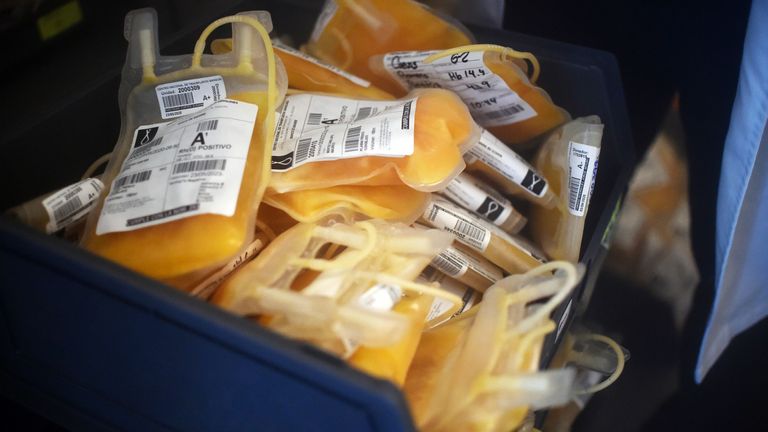COVID-19: NHS urges patients who beat coronavirus to keep donating blood plasma despite new findings
The NHS is urging people who have recovered from COVID to keep donating blood plasma, despite new findings from an international study that suggest it has no benefit in treating other seriously ill patients.
The REMAP-CAP trial, which spans three continents, has paused treatment of the sickest patients in intensive care following disappointing interim analysis of 900 participants.
The researchers have now switched to treating moderately ill patients in hospital instead.
Plasma is the part of the blood that contains antibodies against the virus that causes COVID-19. The hope has been that blood from people who have recovered from the disease contains high levels of antibodies that can neutralise the virus and stop tissue damage.
Anthony Gordon, professor of anaesthesia and critical care at Imperial College London and one of the researchers, said the findings were “disappointing”, but important.
“Convalescent plasma is a precious resource, and we can now continue to focus on identifying exactly which patients might benefit the most from treatment – maybe people earlier in their illness or those with weak immune systems,” he said.
The NHS is already treating hospital patients with plasma before they become seriously ill as part of the globally-respected Recovery Trial.
Peter Horby, the trial’s chief investigator, said: “We don’t yet know if convalescent plasma works as a treatment for COVID patients, but if it does it would have a major impact worldwide.
“Plasma from patients who have recovered from COVID-19 contains antibodies that may help to speed up clearance of the virus from those who are suffering from the disease and improve their chances of recovery, particularly if they are treated before they become severely ill.
“By volunteering to donate plasma you will ensure we complete the study and provide the evidence we need to improve care for COVID patients and save lives.”
NHS Blood and Transplant (NHSBT) is collecting thousands of units a week from people who have recovered from the disease. More than 800 people a week are receiving treatment.
Dr Gail Miflin, chief medical officer at NHSBT, urged people to keep donating.
“You could save lives,” she said.
“The emerging evidence from international studies is that use before intensive care may prove to be more effective.”
Source: Read Full Article




